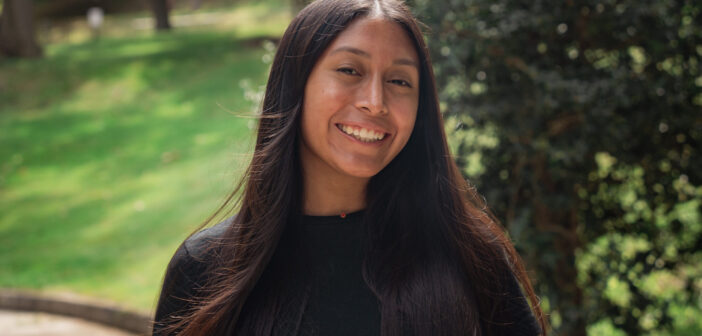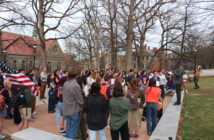Early in the morning of Nov. 6, 2024, Donald Trump was elected president of the United States. Just a few hours later, I woke up, feeling like the world around me was crumbling.
Last year was my first time voting in a presidential election. My mother, sister and I gathered around our kitchen table, circling Vice President Kamala Harris on our mail-in ballots. The night of Nov. 5, there was hope.
This hope carried me through the weeks leading up to the election. I thought the U.S. would see its first female president and that I was going to be part of that history.
Even though I had already submitted my ballot, I waited in line at the Banana Factory for four hours with my friend on Election Day, just to experience the excitement. My feet hurt, but I was happy.
When the polls closed, I went home. I turned the Sunset Lamp in my room to blue, hoping Pennsylvania would turn blue too.
As I got ready for bed, I continued watching the news. That’s when the anxiety kicked in. Why was every state projecting Trump as the winner?
At the same time, I received a text from my grandmother that read, “No matter what, we’ll be okay.”
That’s when I knew.
I went to bed at 2 a.m., and the first thing I saw when I woke up at 6 a.m. was a headline declaring Trump had defeated Harris and won the 2024 presidential election.
I couldn’t stop the tears that ran down my cheeks.
Another text from my grandmother read, “I hope you know we will get through this. It’s very disappointing to say the least, but we will carry on. At least he can’t run again. I love you.”
I’m not writing this to judge who you may or may not have voted for. I’m writing this because elections have real consequences. Because there are people — people like me — who are affected by their outcomes.
Five core issues defined this election cycle — the economy, abortion, immigration, foreign policy and the state of our democracy.
Harris won the vote of about three in four voters who prioritized abortion, but Trump won over the voters who prioritized immigration and the economy.
For me, immigration hits closest to home.
I was adopted from Guatemala when I was eight months old. I’ve been a U.S. citizen for 20 years, four months and three days.
I made it to the U.S., but my biological family members are still in Guatemala. I wonder if they’ve ever tried to cross the border. If they have, would they have been treated with dignity or met with hostility?
Hispanic U.S. citizens and noncitizens have been apprehended by Immigration and Customs Enforcement because of the way they look, because they speak a different language, and because Trump’s rhetoric has fueled fear and division in a country built by immigrants.
I’ve never felt like an outsider in my own family. But as time goes on, I’ve become more afraid of how others might see me and what that could mean for my safety.
When I was 13 years old, I was traveling home from school like I usually did. I took the bus to our playing fields before walking the 12 minutes home. When I got there, I followed my usual routine — coming in through the garage, letting my dogs out and making an early dinner before my tennis lesson.
Then, a loud knock on my front door startled me. I ignored it, thinking it was just UPS. But then, I heard another knock. This time, it was accompanied by, “Police. Open up.”
I jumped out of my chair. What could possibly be happening in my quiet suburban neighborhood?
I opened the door to find two white male police officers staring at me. They told me they received a call about a “small Hispanic man” breaking into my house.
My house was made up entirely of women. There were no Hispanic men. The only Hispanic person in the neighborhood was me.
I told them this was my house and invited them inside.
As we spoke, my sister emerged from her room, tears streaming down her face. “It was you?” she asked.
Confused, I asked what she meant. Then, it all made sense.
She had come home early and wasn’t expecting me. When she heard the garage open and saw someone enter, she hid in her closet and called 911.
My whole family laughs about this story now. I laugh too. But sometimes, I wonder — what would’ve happened if this had been today? If I had been older? If the officers hadn’t believed me? If they had seen me as an “illegal” instead of a kid coming home from school?
When Trump was declared the winner, my mom texted me, “Always good to carry this in these crazy times. Hope it doesn’t happen, but if it does, you remain calm and respectful. Show them your ID, including the photo of your passport.” Attached was a PDF of my passport.
I understand the odds of being stopped by ICE are low, but it’s not impossible. It happened at Muhlenberg College, a school just 24 minutes away from Lehigh, and it’s starting to feel like it could happen any day to people who look like me. This is the new reality we live in.
Some of my friends and people I care about voted for Trump. I don’t judge them for it, but I wonder why. I wonder if they’ve ever considered how his words and policies affect people like me — how they make me feel afraid in a country that has been my home since I was eight months old.
As I’ve put this piece together, searching for the right words, I’ve realized that sharing my story is the only way to make sense of it all.
I’ve spent my life holding parts of myself close, hoping to feel like I belong. But the truth is, belonging shouldn’t mean staying silent.






Comment policy
Comments posted to The Brown and White website are reviewed by a moderator before being approved. Incendiary speech or harassing language, including comments targeted at individuals, may be deemed unacceptable and not published. Spam and other soliciting will also be declined.
The Brown and White also reserves the right to not publish entirely anonymous comments.